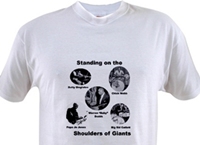
This time around I will share my review of the album:
I could have subtitled this 'Garbo speaks' because hearing Papa Jo's voice for the first time is a surprise. This 1973 album truly is an oral history, with a good deal of demonstration on the drum kit by the master to reinforce his recollections and opinions.
The album starts out with Papa Jo playing a signature groove solo, then he introduces himself. Next he proceeds to discuss the basic drum kit, including traps such as cowbells, slapsticks and whistles. The latter were essential implements to drum kit players, pit and theater drummers of his era, and the earliest pioneers who came a generation before him. A modern drummer, or even one from my era (I started in 1964), will probably find this information quaint at best. On the other hand, it does provide insights into those giants upon whose shoulders we stand - and Papa Jo was one of those giants.
The next group of tracks consists of his discussion of drummers who influenced or impressed him when he was coming up. For most of them he also plays a few bars of their signature sound, which is the show and tell aspect of this album.
Included in his influences are some of the greats who you would expect: Baby Dodds, Chick Webb, Gene Krupa, and Sid Catlett. See this post for more about those drummers.
There are some surprises, such as Billy Gladstone who was an orchestral drummer and from whom another great drummer who greatly admired Papa Jo, Joe Morello, briefly took lessons. As an aside, when Morello described Gladstone he said to imagine Buddy Rich, but twice as smooth and twice as fast. Morello also mentioned that Billy could not swing to save his life. Speaking of Buddy, he was not mentioned, although Sonny Greer - Ellington's long time drummer - was. Indeed, Papa Jo's breakdown of Sonny's groove was illuminating to me. Taken out of musical context it did not sound very special. However, it worked magic for Ellington.
While many of the other drummers Papa Jo cited are lost to the dustbins of history, Samuel "Baby" Lovett was still alive when this album was made. In fact, Lovett was captured on film six years after this album was made in the 1979 documentary titled The Last of the Blue Devils - The Kansas City Jazz Story (which also featured Papa Jo.)
One singularly intriguing drummer Jones discussed is Manzie Campbell whom he insisted was the greatest drummer in the world. I wrote a brief piece that should show up in a search about Campbell, and while there are tantalizing bits of information, there is much missing. That is a shame.
Others included Walter Johnson, Alvin Burroughs and A.G. Godley are also discussed at length. For all of the discussion of influences, I was somewhat disappointed that Papa Jo's teacher, Wilson Driver, was not mentioned.
Next is Papa Jo's discussion of dancers who influenced and impressed him. He highlighted Pete The Tapper (Pete Nugent), Eddie Rector, Baby Laurence, Bill "Bojangles" Robinson. Moreover, he played a few bars to illustrate their rhythms. Oddly, he used sticks to do that. The reasons that is odd - using sticks - is Jones invented the brush vocabulary. Modern brush masters like Clayton Cameron have discussed at length the relationship between tap dancing and brush playing, as has Mark Griffith who is not only a great drummer in his own right, but also the author of much of the booklet that accompanies The Art of Playing with Brushes DVD/Play Along CD. That booklet contains an article that also makes a strong connection between the two.
The final parts are Papa Jo playing more signature grooves that are easily recognizable as his own, and the finale of Papa Jo and the great Willie "The Lion" Smith doing a number called Sweet Sue. That is the only track in which Papa Jo accompanies another musician and it is, well, jaw dropping when you consider what he is doing.
If you are researching Papa Jo, there are two other essential resources: the radio interviews with Milt Hinton, also from 1973, that is also provided in my 26 February 2010 post and in his biography Rifftide: The Life and Opinions of Papa Jo Jones, and, of course, the chapter devoted to him in Drummin' Men: The Heartbeat of Jazz The Swing Years.
This will not be my last post about Papa Jo Jones because when I learn something that I think may be interesting I share it. I am always learning something new about that remarkable man.



No comments:
Post a Comment